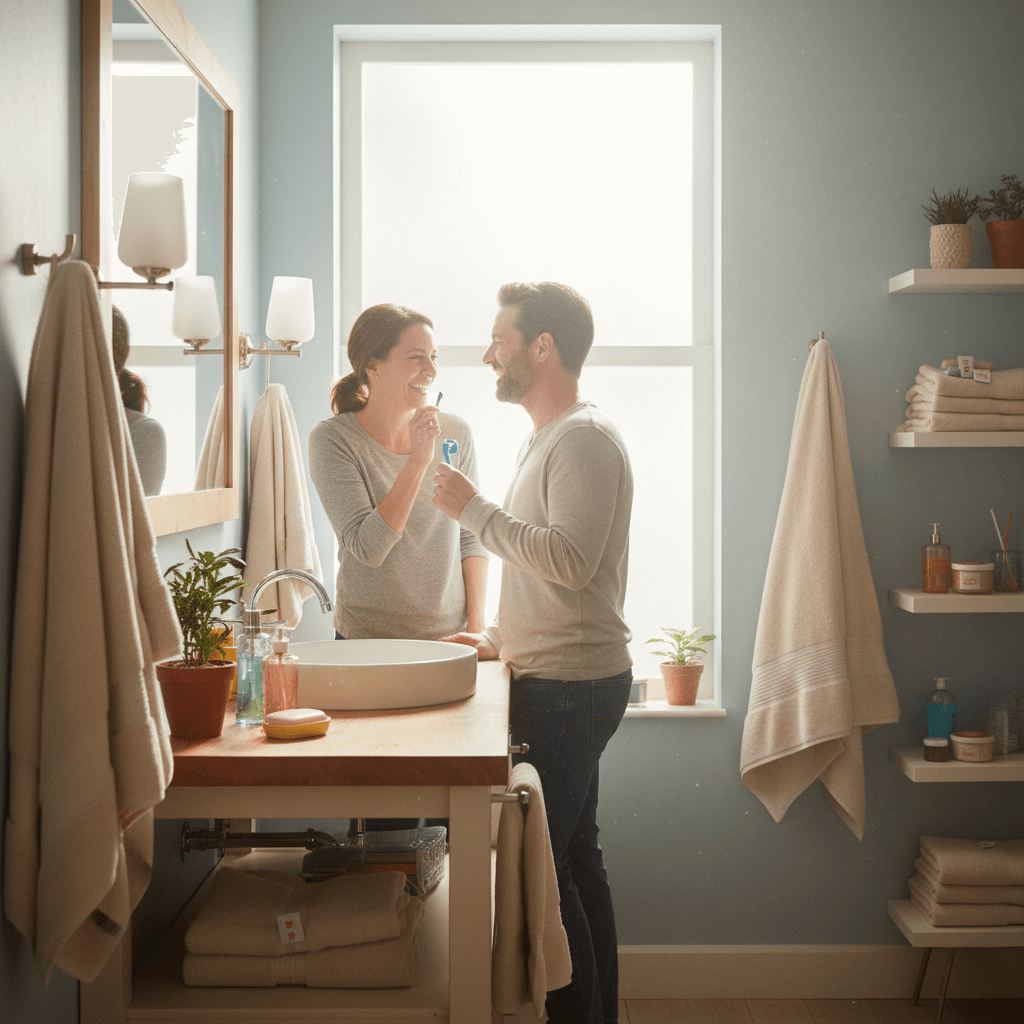Where Every Connection Becomes a Bond

You close the bathroom door behind you, finally alone for the first time all day.
As you wash your face, you notice the way your partner left their towel on the floor again—or maybe how they meticulously hang it exactly where it belongs.
These tiny, seemingly insignificant bathroom moments? They’re telling you everything about the deeper health of your relationship.
The bathroom is where our most private, vulnerable selves emerge. It’s where we drop our social masks and just exist.
And when you share this intimate space with someone, the way you both navigate it reveals the unspoken dynamics between you—the respect, the care, the resentment, or the disconnect.
Let’s look at what your daily bathroom routines are quietly saying about your marriage.
1. The Door Is Always Locked (Or Never Closed)
Notice whether the bathroom door has become a fortress or a non-existent boundary.
If it’s always locked, even for simple tasks, it might signal emotional withdrawal.
One partner constantly needing total privacy—refusing even casual conversation through the door—often reflects a deeper need for emotional distance.
They’re creating physical barriers because they feel emotionally invaded or overwhelmed elsewhere in the relationship.
On the flip side, if neither of you ever closes the door anymore, you might have fallen into extreme comfort—which isn’t always healthy.
Sometimes “too comfortable” becomes “taking each other for granted.”
When there’s zero sense of personal boundaries, even in the bathroom, it can erode the subtle mystery and respect that keeps attraction alive.
A healthy marriage finds balance—privacy when needed, openness when natural.
If you’ve lost that rhythm, it’s worth asking why.
2. One Person Cleans Everything (And Resents It)
Watch who scrubs the toilet, wipes the counter, and picks up the used towels.
If it’s always the same person, and they’re doing it with gritted teeth and heavy sighs—that’s a massive red flag.
This isn’t just about cleaning.
It’s about perceived value and partnership.
When one person consistently maintains the shared space while the other remains oblivious, it breeds deep resentment.
The cleaner starts to feel like a maid, not a partner.
They wonder: “Do they even see what I do? Do they respect my time and effort?”
Meanwhile, the other partner might genuinely not notice—or they’ve unconsciously decided this division of labor is “fair” based on outdated relationship scripts.
Strong marriages have equity, not equality.
You don’t have to split every task 50/50, but both people need to actively contribute and acknowledge the effort the other puts in.
If your bathroom maintenance has become a solo, thankless job, it’s time to talk about shared responsibility.
3. Personal Care Items Tell a Story of Self-Worth
Look at the products lining your bathroom shelves.
Are both partners investing in themselves, or has one completely stopped trying?
When someone abandons their self-care routine—no skincare, no grooming rituals, nothing that makes them feel good—it often signals disconnection from themselves and the relationship.
They’ve stopped believing they’re worth the effort, or they’ve stopped believing their partner notices or cares.
Conversely, if one partner is obsessively maintaining their appearance while the other has given up entirely, it creates an imbalance.
The one still trying may feel unappreciated or like they’re “too good” for their partner now.
Healthy couples encourage each other’s self-care.
They notice when their partner gets a haircut.
They compliment the new cologne.
They create space for each other to feel attractive and valued—not just for each other, but for themselves.
4. Morning Routines Happen in Silence (Or Constant Conflict)
Pay attention to the energy in the bathroom during your morning rush.
Is it peaceful coexistence, tense silence, or outright irritation?
If you’re both brushing your teeth in complete silence, avoiding eye contact in the mirror, barely acknowledging each other’s presence—that coldness doesn’t stay contained in the bathroom.
Maybe you used to chat about the day ahead while getting ready.
Now, you’ve built invisible walls, treating the bathroom like a subway car full of strangers.
Alternatively, if every morning is a fight over counter space, shower time, or who gets ready first, that aggression reveals a lack of respect for each other’s needs and time.
You’re both operating from a place of “me vs. you” instead of “us.”
Couples in healthy marriages find ways to share the space gracefully.
They coordinate, compromise, and sometimes even enjoy those mundane moments together—a quick kiss before rushing out the door, a shared laugh at bedhead.
When that connection disappears, the relationship feels the absence everywhere.
5. Toilet Seat Debates Never Got Resolved
Yes, we’re going there.
The classic toilet seat argument might seem trivial, but it’s actually a perfect microcosm of how you handle conflict and consideration.
If this issue is still causing fights after years together, it’s not about the seat.
It’s about one person refusing to adjust their behavior for the other’s comfort, or one person making unreasonable demands without flexibility.
Strong couples solve the small stuff because they prioritize each other’s comfort.
They don’t let ego dictate bathroom etiquette.
If you can’t find compromise on a toilet seat, how are you handling the big decisions—finances, parenting, life goals?
The inability to resolve minor friction often predicts how you’ll manage major conflicts.
6. Intimate Hygiene Gets Neglected (Or Becomes Performative)
Notice the effort both partners put into personal hygiene when intimacy is on the table.
Has one person stopped caring entirely, showing up without basic grooming or freshness?
That signals they’ve stopped valuing the intimate connection—or they’ve unconsciously decided their partner’s attraction doesn’t matter anymore.
It’s a form of taking someone for granted.
On the other hand, if hygiene only happens before planned intimacy and never otherwise, it becomes transactional.
The bathroom routine transforms into a performance, not genuine care.
Healthy marriages maintain baseline hygiene and grooming as a form of self-respect and mutual respect.
You don’t have to be “perfect” all the time, but consistent neglect or purely performative effort both indicate disconnection from the relationship’s intimate foundation.
7. Separate Bathrooms Feel Like Separate Lives
If you have two bathrooms and rarely step into each other’s space, ask yourself why.
Are you avoiding each other?
Have you created entirely separate morning and evening routines so you never have to interact during vulnerable, unguarded moments?
Sometimes separate bathrooms are purely practical—different schedules, different preferences.
But if it’s become a way to avoid intimacy and connection, it’s a warning sign.
You’ve physically divided your lives in a way that mirrors emotional division.
The bathroom becomes a symbol of how much space you’re intentionally putting between you.
Couples who thrive find ways to stay connected even across separate spaces.
They still check in, still share moments, still make each other feel seen and valued.
8. Health Issues Get Hidden Instead of Shared
Watch whether health concerns—digestive problems, skin issues, medication routines—are openly discussed or secretly managed.
If one partner is hiding health struggles or feeling ashamed to be vulnerable, it reflects a lack of emotional safety in the marriage.
They don’t trust their partner to respond with empathy and support.
Maybe they’ve learned that showing weakness leads to criticism or dismissal.
So they suffer alone, pretending everything is fine.
Strong marriages create space for vulnerability.
The bathroom is where our bodies are most honest—where we deal with illness, aging, and physical realities.
If you can’t be real with your partner about these intimate struggles, the emotional intimacy of your marriage is already compromised.
9. The Bathroom Has Become Your Escape
Finally, notice if the bathroom is where you hide.
Are you taking longer showers just to avoid conversation?
Sitting on the toilet scrolling your phone for 20 minutes because you don’t want to face your partner?
When the bathroom transforms from a functional space into an emotional refuge, it means you’re avoiding something painful in the relationship.
You’ve lost the desire to connect.
You’d rather be alone with your thoughts—or your screen—than engage with the person you married.
This is one of the most telling signs.
The bathroom becomes the only place you feel at peace because the rest of your shared life feels heavy, tense, or empty.
What Your Bathroom Habits Are Really Telling You
These small, daily routines aren’t just about hygiene or housekeeping.
They’re mirrors reflecting respect, intimacy, resentment, connection, and care.
If you recognize troubling patterns, don’t panic—but don’t ignore them either.
Start small conversations.
Notice each other again.
Ask yourself: “Am I showing up for this person in the everyday moments, or have I checked out?”
Your marriage’s health isn’t determined by grand gestures.
It’s built in the quiet, mundane spaces—like the bathroom you share every single day.
What story is yours telling?




